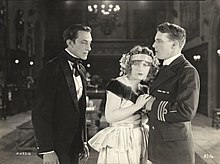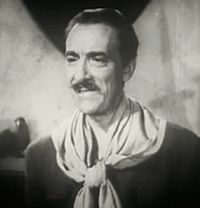Pedro de Cordoba
This article needs additional citations for verification. (July 2015) |
Pedro de Cordoba | |
|---|---|
 | |
| Born | Pietro de Cordoba September 28, 1881 New York City, USA |
| Died | September 16, 1950 (aged 68) Sunland, California, USA |
| Resting place | Holy Cross Cemetery, Culver City |
| Occupation | Actor |
| Years active | 1901–1951 |
| Spouse(s) | Antoinette Glover
(m. 1917; died 1921)Eleanor M. Nolan
(m. 1928) |
Pedro de Cordoba (September 28, 1881 – September 16, 1950) was an American actor.
Biography[]
De Cordoba was born in New York City to parents who were French and Cuban in origin. He was a classically trained theatre actor who confessed he did not enjoy appearing in silent films nearly as much as he liked working on stage, but his career during the silent film era was extensive. His first film was Cecil B. DeMille's version of Carmen (1915), and he soon became a popular leading man in Hollywood. His Broadway career cast him with such stage actresses as Jane Cowl and Katharine Cornell.
Later, his deeply resonant speaking voice made him perfectly suited to talking pictures, and his film career continued, unlike many silent film stars. He enjoyed a career as a busy character actor in Hollywood, from the 1930s through to the end of his life. He was most often cast as aristocratic, or clerical characters of Hispanic origin, as in The Keys of the Kingdom (1944), because of his last name as well as his royal bearing. On rare occasions, he would be cast in the role of a villain. His "living skeleton" sideshow character hides fugitive Robert Cummings (and Priscilla Lane) in his carnival wagon overnight in the Alfred Hitchcock film Saboteur (1942).
He was a devout Catholic and was very well read and knowledgeable about the Catholic faith, and served for a time as president of the Catholic Actors Guild of America. The last film in which he appeared, a political drama set in an unnamed South American dictatorship, Crisis (1950), was released shortly after his death.
Selected filmography[]



Silent[]
- The Little White Violet (1915) (*short) as Phillip Randall
- Jeanne of the Woods (1915) (*short) as Hugh Travers N.W.M.P.
- Carmen (1915) as Escamillo
- Temptation (1915) as Julian
- Maria Rosa (1916) as Ramon
- Just a Song at Twilight (1916) as Carlysle Turner
- Sapho (1917) as Flamant
- One Law for Both (1917) as Count de Fernac
- Barbary Sheep (1917) as Benchaalal
- Runaway Romany (1917) as Zinga
- A Daughter of the Old South (1918) as Pedro de Alvarez
- The New Moon (1919) as Prince Michail Koloyar
- The Dark Mirror (1919) as Mario
- The World and His Wife (1920) as Don Severo
- The Sin That Was His (1920) as Father Aubert
- The Inner Chamber (1921) as Dr. George Danilo
- The Young Diana (1922) as Dr. Dimitrius
- When Knighthood Was in Flower (1922) as Duke of Buckingham
- Enemies of Women (1923) as Atilio Castro
- Fires of Fate (1923) as Prince Ibrahim
- The Purple Highway (1923) as Joe Renard
- I Will Repay (1923) as Paul Deroulede
- The Desert Sheik (1924) as Prince Ibrahim
- The Bandolero (1924) as Dorando
- The New Commandment (1925) as Picard
Sound[]
- Hunt the Tiger (1929) (*short)
- The Crusades (1935) as Karakush
- Condemned to Live (1935) as Dr. Anders Bizet
- Captain Blood (1935) as Don Diego
- Professional Soldier (1935) as Stefan Bernaido
- Rose of the Rancho (1936) as Gomez
- Robin Hood of El Dorado (1936) as Hacendado Wanting to Cooperate (uncredited)
- Moonlight Murder (1936) as Swami
- Frankie and Johnny (1936) as Undetermined Supporting Role (uncredited)
- Trouble for Two (1936) as Sergei
- The Devil-Doll (1936) as Charles Matin
- Anthony Adverse (1936) as Brother Francois
- His Brother's Wife (1936) as Dr. Capolo
- Ramona (1936) as Father Salvierderra
- The Garden of Allah (1936) as Gardener (uncredited)
- Maid of Salem (1937) as Mr. Morse
- Girl Loves Boy (1937) as Signor Montefiori
- Damaged Goods (1937) as Dr. Edward B. Walker
- The Firefly (1937) as Spanish General (uncredited)
- International Settlement (1938) as Maurice Zabello
- Gold Diggers in Paris (1938) as Mons. Cambret (uncredited)
- Keep Smiling (1938) as J. Howard Travers
- Storm Over Bengal (1938) as Abdul Mir
- Dramatic School (1938) as LeMaistre in "Joan of Arc" (uncredited)
- Heart of the North (1938) as Father Claverly
- Devil's Island (1939) as Marcal
- Winner Take All (1939) as Pantrelli
- Juarez (1939) as Riva Palacio
- Man of Conquest (1939) as Oolooteka
- Chasing Danger (1939) as Gurra Din
- Five Came Back (1939) as Latin Ambassador (uncredited)
- Range War (1939) as Padre Jose
- Law of the Pampas (1939) as Jose Valdez
- Charlie Chan in City in Darkness (1939) as Antoine
- Escape to Paradise (1939) as Don Miguel
- The Light That Failed (1939) as Monsieur Binat
- My Favorite Wife (1940) as Dr. Kohlmar
- Earthbound (1940) as Minister
- The Ghost Breakers (1940) as Havez
- The Sea Hawk (1940) as Capt. Mendoza
- South of Pago Pago (1940) as Chief
- Before I Hang (1940) as Victor Sondini
- The Mark of Zorro (1940) as Don Miguel
- The Phantom Submarine (1940) as Henri Jerome
- Romance of the Rio Grande (1941) as Don Fernando de Vega
- Blood and Sand (1941) as Don Jose Alvarez
- Million Dollar Baby (1941) as Verali, Orchestra Conductor (uncredited)
- Aloma of the South Seas (1941) as Raaiti
- The Corsican Brothers (1941) as Count Gravini
- Paris Calling (1941) as Speaker (uncredited)
- Son of Fury: The Story of Benjamin Blake (1942) as Feenou
- Shut My Big Mouth (1942) as Don Carlos Montoya
- Saboteur (1942) as Bones - Circus Troupe
- The Falcon Takes Over (1942)
- Tarzan Triumphs (1943) as Patriarch
- White Savage (1943) as Candlemaker
- Background to Danger (1943) as Baba - Old Turk (uncredited)
- For Whom the Bell Tolls (1943) as Colonel Miranda
- The Song of Bernadette (1943) as Dr. LeCramps
- Uncertain Glory (1944) as Executioner (uncredited)
- Once Upon a Time (1944) as Prof. Van Dorn - Lepidopterist (uncredited)
- The Falcon in Mexico (1944) as Don Carlos Ybarra
- Kismet (1944) as Meuzin (uncredited)
- The Keys of the Kingdom (1944) as Father Gomez (scenes deleted)
- Tahiti Nights (1944) as Tonga (uncredited)
- The Picture of Dorian Gray (1945) as Blue Gate Fields Pianist (uncredited)
- In Old New Mexico (1945) as Father Angelo
- Club Havana (1945) as Charles, Headwaiter
- They Were Expendable (1945) as Priest (scenes deleted)
- San Antonio (1945) as Ricardo Torreon
- Adventure (1945) as Felipe
- Night in Paradise (1946) as Magus (uncredited)
- Cuban Pete (1946) as Perez
- A Scandal in Paris (1946) as Priest
- Swamp Fire (1946) as Tim Rousseau
- Two Years Before the Mast (1946) as Don Sebastian (uncredited)
- The Beast with Five Fingers (1946) as Horatio
- Carnival in Costa Rica (1947) as Papa Castro
- Robin Hood of Monterey (1947) as Don Carlos Belmonte
- Green Dolphin Street (1947) as Priest (uncredited)
- The Time of Your Life (1948) as Arab Philosopher
- Mexican Hayride (1948) as Señor Martinez
- Adventures of Don Juan (1948) as Pachecho (uncredited)
- Daughter of the West (1949) as Chief Wykomas
- Omoo-Omoo, the Shark God (1949) as Chief Tari
- The Daring Caballero (1949) as Padre Leonardo
- Joe Palooka in the Counterpunch (1949) as Museum Caretaker (uncredited)
- Samson and Delilah (1949) as Bar Simon
- Comanche Territory (1950) as Quisima
- The Lawless (1950) as Mr. Garcia
- Crisis (1950) as Father Del Puento (uncredited)
- Oh! Susanna (1951) as Pactola (uncredited)
- Cuban Fireball (1951) as Don Perez
- When the Redskins Rode (1951) as Chief Shingiss (final film role)
Radio appearances[]
| Year | Program | Episode/source |
|---|---|---|
| 1937 | Lux Radio Theatre | Madame Butterfly |
| 1946 | Hollywood Star Time | The Song of Bernadette[1] |
References[]
- ^ "Those Were the Days". Nostalgia Digest. 41 (2): 32–41. Spring 2015.
External links[]
| Wikimedia Commons has media related to Pedro de Cordoba. |
- Pedro de Cordoba at IMDb

- Pedro de Cordoba at the Internet Broadway Database

- Pedro de Cordoba at AllMovie - entry #1
- Pedro de Cordoba at AllMovie - entry #2 (All Movie has disjointed entries)
- Pedro de Cordoba at Find a Grave
- left to right: Gladys Hulette, Lionel Barrymore, Pedro de Cordoba in Enemies of Women (1923)
- nytimes.com – New York Times > Movies > Pedro de Cordoba
- nytimes.com – News clippings
- 1881 births
- 1950 deaths
- American male stage actors
- American male silent film actors
- American male radio actors
- American male film actors
- Male actors from New York City
- American people of Cuban descent
- American people of French descent
- Burials at Holy Cross Cemetery, Culver City
- 20th-century American male actors
- American Roman Catholics
- Hispanic and Latino American male actors